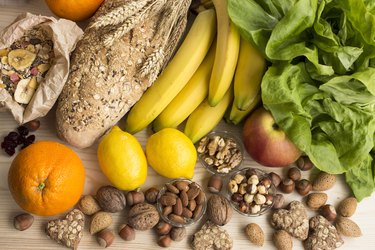
The microbiome and the gut-brain connection get a lot of buzz, but it's not always totally clear what they are exactly. Maybe you know some bacteria are involved and that the "gut" plays a role, but the details beyond that can get a bit fuzzy.
The microbiome may sound complicated, but it's actually a pretty simple concept to understand. What's not simple, however, is its role in many different aspects of our health. Science is only just scratching the surface of the many ways that the bacteria living in our gut affect our health. Here's what we know so far about the microbiome and why it's so important.
What Is the Microbiome?
The microbiome is the bacterial environment in the gut, specifically the large intestine in normal situations, explains Ashkan Farhadi, MD, a gastroenterologist at MemorialCare Orange Coast Medical Center in Fountain Valley, California. Some people also consider the bacteria that live in the mouth to be part of the GI tract, and thus the microbiome, too.
The bacteria of the microbiome include thousands and thousands of different types of species, not just one or two types, Dr. Farhadi tells LIVESTRONG.com. There's no way to pinpoint the exact number, he says, but it's known that there are millions of bacteria in the gut. "It's a big, big number," Dr. Farhadi says. "Picture a society of different kinds of bacteria that all live together."
For years, it was thought that the microbiome acted like a "fingerprint," with each person having their own unique set of bacteria within their microbiome, Dr. Farhadi says. Now, doctors know that the microbiome is a dynamic, constantly changing environment, he says. In fact, it's so dynamic that your microbiome at this moment could be vastly different from your microbiome one hour from now.
Related Reading
What Affects Your Microbiome?
Factors that affect — and change — your microbiome include everything from how much sleep you get to your stress levels to what medicine you take to the food you eat.
1. Food

All sorts of things shape our gut bacteria, but the food we eat is likely the most important, says Mona Cabrera, RD.
Processed and refined foods including meats, sugars and alcohol can have a negative effect, Cabrera says. After only five days of eating a diet high in animal fat and low in fiber, people experienced a rise in bile-tolerant bacteria, which are linked to anti-inflammatory bowel disease, in a January 2014 study in Nature.
On the other hand, Cabrera notes that switching to a high-fiber diet with complex carbs produces a greater diversity of gut bacteria, more fiber-loving bacteria and lower markers of colon inflammation, according to a June 2018 study in Cell Host and Microbe.
Related Reading
2. Probiotics
Probiotics are live microorganisms that we take in and are meant to be "good" bacteria in our guts, per the National Center for Complementary and Integrative Health (NCCI). Probiotics can be found in both supplements and in foods.
Probiotic foods such as kimchi, kombucha, yogurt, sauerkraut and tempeh all they deliver live, beneficial bacteria to our gut, Cabrera says.
Most people will benefit from a high-fiber diet that includes probiotics, to encourage the growth of good bacteria, Dr. Farhadi says. But pay attention to how your body responds to those foods: Some people, for instance, are sensitive to FODMAPs, a group of foods that includes many fruits, vegetables and grains. If you notice any particular food or group of food causes you excessive gas or bloating, Dr. Farhadi says you may want to avoid it.
What About Supplements?
You can definitely consider taking probiotic supplements, Dr. Farhadi says.
But keep in mind that there are so many species flourishing in our microbiome, doctors haven’t yet pinpointed what each one does. Even if researchers are able to determine what one given species of bacteria does, its exact action will vary in every individual based on other microbiome factors.
So, the short answer is: While probiotics may be able to help and probably won’t hurt you in any way, it’s incredibly difficult to identify exactly which strain you should take for a certain condition or even just overall general microbiome health.
3. Prebiotics
Prebiotics foster the growth of friendly gut bacteria, so they act as food for the "good" probiotics in our guts, Cabrera says.
Here's why: The microbiome lives off of the undigested food in our intestines, so the things that we can't digest and absorb become food for the bacteria in the microbiome, Dr. Farhadi says. Based on what we eat, then, some bacteria species in the microbiome will flourish more than others because we've fed them what they prefer.
Insoluble fiber is especially important to encourage the growth of good bacteria in the microbiome, Dr. Farhadi adds.
Good Sources of Prebiotic Foods
To get more prebiotics, add these foods to your diet, per Cabrera and the Harvard School of Public Health:
- Oats
- Asparagus
- Bananas
- Dandelion greens
- Leeks
- Onions
- Garlic
- Beans
- Sweet potatoes
4. Other Factors

Almost every single action in your life also affects your microbiome, from how much sleep you get to how you manage stress. For instance, sleep deprivation was linked with negative changes to the microbiome, while adequate sleep was tied to a more diverse microbiome environment, per an October 2019 study in PLOS One.
Genetics may also play a role in shaping which bacterium make up the microbiome, according to a November 2014 article in the journal Cell, although to what extent — and how much we can change it with our own actions — is still unclear.
The Role of the Microbiome in Health
There is not a single disease that is not connected to the microbiome, Dr. Farhadi says. From neurological to autoimmune to cardiovascular, all diseases are connected to the microbiome in one way, shape or form, he says. The microbiome is also thought to be associated with a rise in the number of autoimmune disorders, such as rheumatoid arthritis, Crohn's disease and asthma, Dr. Farhadi says.
But while it's clear that diseases are connected in some way to the microbiome, it's not certain exactly how and what that connection is.
"Our understanding of the microbiome is so rudimentary," Dr. Farhadi says. "We know it's important, but we don't know why things are happening. They are a society of germs in us and we react to them, they react to us — but the details of that? Well, we are in the dark."
What Is the Gut-Brain Connection?

The microbiome is also connected to mental health — but a better term than "gut-brain connection" is "brain-gut-microbiome connection," Dr. Farhadi says. The brain can both affect the gut and modify bacterial behavior in the gut, and vice versa.
For example, bacteria in the gut can release chemicals that modify neurons in the brain, which will then release chemicals such as serotonin, which can affect your mood. "We know that this connection is extended to bacteria, and bacteria back to us," Dr. Farhadi says.
But although we know that the connection works both ways — that both our brain can affect our gut and our gut can affect our brain — the details of this connection are "blurry," he adds.
There have been early animal experiments on how to modify depression by changing the levels of types of bacteria in the gut, as well as experiments that show that stress in animals completely changes their gut bacteria, but the specifics of the connection remain unknown, Dr. Farhadi says.
His own pilot study, published in April 2018 in the Journal of Neurogastroenterology and Mobility, found a link between irritable bowel syndrome (IBS) and subjective wellbeing, but again, precisely how mood and GI symptoms affect each other needs more research.
"We aren't at the level to modify certain germs to impact our mood yet," Dr. Farhadi says.
Someday, the future of medicine may include treatment with bacteria for everything from autoimmune disorders to depression, but now, as doctors continue to study the microbiome, some of the best things you can do to support a diverse microbiome including getting enough sleep, managing your stress levels and eating a well-balanced diet that includes both pre- and probiotics.
Is this an emergency? If you are experiencing serious medical symptoms, please see the National Library of Medicine’s list of signs you need emergency medical attention or call 911.